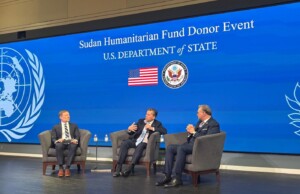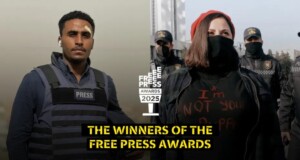Sudan Journalists Network: ‘Media Charter of Honour worthless unless NISS ceases press harassment’
The Sudanese Journalists Network has said the signing of a media Charter of Honour on Thursday is of no use if the National Intelligence and Security Service (NISS) does not stop its interference with the press, and stops harassing and persecuting journalists.
 A newspaper kiosk in Khartoum (File photo: SUNA)
A newspaper kiosk in Khartoum (File photo: SUNA)
The Sudanese Journalists Network has said the signing of a media Charter of Honour on Thursday is of no use if the National Intelligence and Security Service (NISS) does not stop its interference with the press, and stops harassing and persecuting journalists.
The network said in a statement on Friday that it sees no benefit from the charter under a number of laws that restrict press work and prosecute journalists. The statement asserts that the participation of the security apparatus in signing the charter is absolute proof that the NISS rather than the press base is behind the charter.
The statement also points out that “the presence of a charter in the presence of a Press Act indicates that the authorities do not recognise that journalists are governed by their professional honour and ethics”.
The network called on Sudanese journalists “to stand united against these absurd acts, which reflect the increasing power of the authorities over the newspapers, the journalists and freedom of speech”.
Rejected
Iman Osman, the editor-in-chief of El Midan newspaper, rejected the Charter of Honour signed on Thursday, and called on the journalists to stand against it. “The charter is a new attack on press freedom in order to stop certain newspapers and certain journalists,” she told Radio Dabanga
“A genuine press charter of honour should be prepared by journalists with the aim of protecting the press. I am surprised by the participation of the security apparatus in preparing the charter, not informing journalists about it and sending it to the editors only.”
Faisal El Bagir, who is the coordinator of the Journalists Association for Human Rights (JAHR), added that the charter has been prepared, revised, reviewed and signed by journalists without interference from others.
JAHR has called on journalists to stand together against the charter before the local judiciary and then move to regional and international mechanisms in the event of unfair ruling against the press.
Ban lifted
The director of the security and intelligence apparatus, Salah Abdallah (aka Salah Gosh) lifted the ban on the critical Hal El Balad programme by Sudanese television Channel 24 and dropped all the complaints filed by the apparatus against journalists and newspapers, while refusing to lift the ban on journalists Zuheir El Sarraj and Osman Shabona of El Jareeda newspaper.
Ongoing media curbs
The Media in Sudan are continuously subjected to confiscations of newspapers, and summons and detentions of journalists.
In the end of June, the cabinet extended the power of the government-controlled Press and Publications Council as well as restrictions on the media to online news outlets, when it passed amendments of the Media and Publication Act. A month later, the NISS restored prior-censorship of newspapers.
In early August, editors-in-chief and the head of the NISS in Khartoum agreed in a meeting to form a committee to deliberate on the so-called red lines set by the security apparatus for Sudanese media. New confiscations of newspapers were therefore briefly suspended.
However, the NISS began gagging the press again on August 27, when the print-runs of El Jareeda and El Tayyar were confiscated. No explanations were given. Four days later, NISS officers stopped the distribution of El Jareeda and El Tayyar again, together with the print-run of El Rai El Aam, without stating a reason.
Abdelaziz told Radio Dabanga at the time that “in the past there used to be ‘red lines’ not to criticise the president or vice-presidents of Sudan, members of the security apparatus, and the police. However, these lines have become very unclear and unpredictable now”.
In early September, three young journalists were summoned by security agents in Khartoum and El Gedaref. A Sudanese reporter was banned from writing. The print-run of El Saiha daily, the newspaper he was writing for, was confiscated on September 8.
Sudan is ranked at the bottom of the World Press Freedom Index by Reporters Without Borders.











 and then
and then